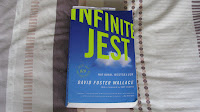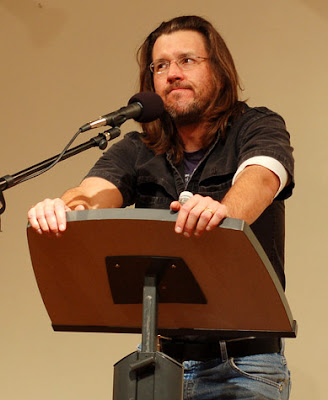The article is titled "Heading to Follow", which is supposed to be a pun that looks like a printer's mistake. I laughed anyway. Disagree with anything in the likely inaccurate and unjustifiably opininated rambling below? — Do let me know through the comments at the bottom.
If, as Marshall McLuhan once said, "the medium is the message" what is Twitter saying to us? And for those of us that use it — still in the minority, despite all the hype — what does it say about us?
Those who aren't familiar with Twitter probably won't be surprised to hear that it's the latest popular something-or-other to hit the "Interweb". It was bound to be, what with all the press it's been getting. Turns out even the kids aren't down with this one. What distinguishes Twitter from other social websites, like Facebook or MySpace, is its simplicity. Virtually all it consists of is a box in which you can put what's called a "status update". This update is normally a record of what you're doing, or thinking, though it's equally likely to be a link to a website you've been looking at. The catch is that the box only allows up to 140 characters — essentially then, no longer than a single text message sent from a mobile phone, which is sort of the point as it turns out. If you've got a mobile you can tell Twitter what you're doing from anywhere with a decent signal.
The updates are recorded on your profile, which otherwise merely consists of a picture, a short description and all the other updates you ever put out. This might be why it doesn't seem to have caught on with people under twenty, according to some demographic studies. You can change what the profile looks like to an extent but there isn't much opportunity to create a strong identity. Also "Friends" aren't a big feature of Twitter like they are on other social networking sites. You can choose to "follow" other users instead, so that whenever they update their status, you see it on the home page. Others, likewise, can choose to follow you, but it hardly mirrors or fosters the kind of relationships younger users of the Web relish.
It's almost too simple really. So simple that people who don't use it don't understand the reason for its existence, let alone its gradually increasing presence in the news and subsequent popularity.
Having said that, you might have a similar problem trying to explain to a hunter-gatherer why you'd want to spend 3.9 hours a day on average (last time I checked) sitting in front of a box of moving pictures. But most of us don't think about television in those bare objective terms, perhaps because we're too busy watching it. The only reason people question the point of Twitter is either because they haven't used it or because the concept is too novel. So perhaps before we can say what Twitter says to and about us and the age we live in, we need to ask the same question of other concepts - for example two that we take for granted.
One could argue that, pace McLuhan, a lecturer in front of class is never merely lecturing on a certain topic. He or she is also, by virtue of the lecture itself, telling the class something simple — that what they say is of importance somehow and that you should listen. Powerpoint as a technology emerged to service that idea, to reinforce it lest our attentions should wander; to emphasise that what the person at the front says goes, for now.
Television, similarly, talks at us. However, it's a little easier for us to change channels, if we fail to switch off altogether. So television ups the stakes a little and tries to make what it tells us entertaining, which might seem hard to believe these days. It's still talking at us but increasingly resorts to either emotional manipulation or irony, in order to keep us engaged. The emotional manipulation is like the equivalent of saying "you'd be a cold-hearted bastard to turn off now". And the irony is saying "Okay so I'm talking at you but we both know this is a one-way conversation and we both know you wouldn't be watching if you didn't want that so let's just wink at each other and get on with it". The most entertaining television manages to combine these opposite poles to great effect. Aside from these two of course there are always last resorts, namely titillation or outright sexual explicitness.
It's possible, of course, for a lecturer to employ televisual-like techniques in a lecture but at a certain point it stops being a lecture. Pull on those heart-strings too much and you've got yourself a "speech". Employ irony and you may have yourself a "routine". Opt for those aforementioned last resorts and you'll have yourself a "burlesque show", or something. The very point of the lecture is to impart information to a preferably large audience. Start doing something else and there's probably another word for it.
With Twitter of course there isn't a one-way conversation; there are several. What Twitter says to us, implicitly like blog tools in general, is that the things you do or think or say as an individual are important. But on Twitter, it's on one forum and there are no distinctions between "posts" and "comments" as you get with blogs. As a result, everyone talks at each other. While it's possible to send messages to one another, either in public or privately, this isn't the point of Twitter. It's designed so that you can announce what you're doing. There's a big give-away to this effect above the box where you enter your updates — it says there: "What are you doing?"
Twitter isn't really built for dialogue therefore. Dialogue might be a side-effect of using it, in the same way that two people might talk to each other while watching Buffy The Vampire Slayer.
In its simplicity, there is at least an honesty to the design of Twitter that one doesn't find with for example Facebook, MySpace, Bebo, Hi5, or any other social networking site you might care to think of. On Twitter at least, the word "followers" instead of "friends" or "fans" keeps the "voyeuristic" aspect that seems to have become part-and-parcel of the social networking game upfront and intentional. Although as David Foster Wallace once said of television, true voyeurism depends upon the voyuee being unaware of their being watched. The main purpose of Twitter, it seems, is to encourage a kind of exhibitionism or performance art. At least, those that use Twitter best seem to manage to make what they're doing or saying or thinking sound entertaining, even when it may be the most mundane thing — they therefore get larger numbers of followers.
I suspect this is why some people have said they didn't understand Twitter before they used it and now they've started they can't stop. It can be entertaining, especially when you can take part in putting on your own text-based show, replete with hyperbole, self-depracation and post-ironic witticism. That isn't to say Twitter can't be useful. If you sign-up and follow the right people, you give yourself access to a wealth of resources, not to mention potential contacts. I personally use it as a way of sharing bookmarks and occasionally commenting on what I've been doing or will do (but never while I'm doing it).
Other ways of using Twitter in teaching and learning include 'backfeeding'. This has been done at a few of the conferences I've been to lately, where the speaker will load Twitter on a screen behind them and all the tweets relevant to the talk will appear for everyone to see. This seems useful when it comes to the "questions and answers" section of the talk but there might even be scope, in the future, for such feeds to change the direction of a presentation — depending on how brave presenters feel in the future. But it hardly feels like the solution to concerns about disengaged and disconnected learners. To find out what that is we're going to have to stop talking at each other first, no matter how much it sounds like we're having a conversation.










